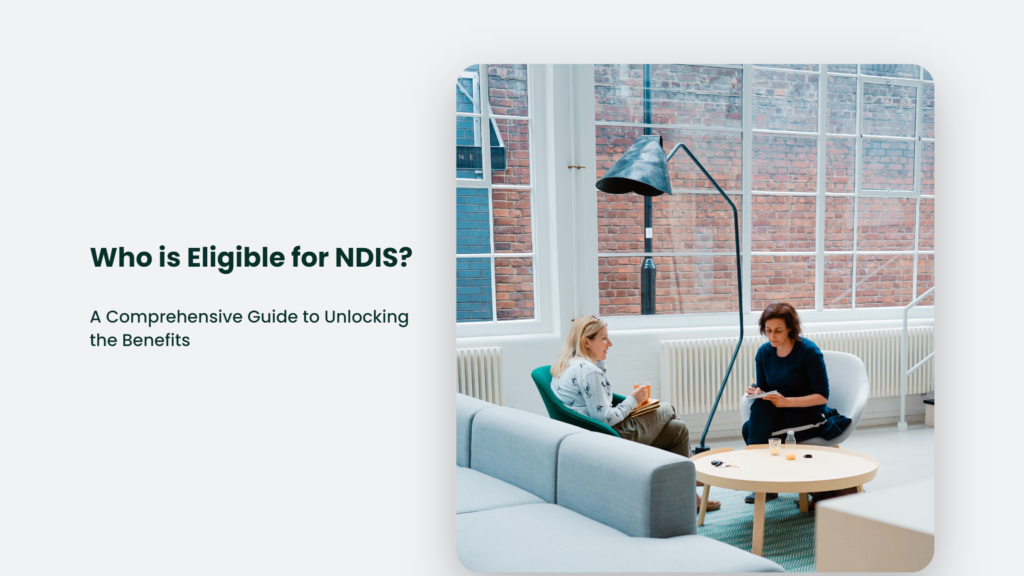Navigating the world of disability support can be daunting, but fear not! In this engaging and in-depth article, we’ll explore the ins and outs of the National Disability Insurance Scheme (NDIS) and determine who is eligible for this life-changing program. So, let’s find out who is eligible for NDIS?

The NDIS: A Beacon of Hope
The NDIS is a game-changer for Australians with disabilities, providing funding and support to help them lead more fulfilling lives. With over 500,000 Australians already benefiting from the program, it’s clear that the NDIS is significantly impacting the lives of those with disabilities and their families.
But Who is Eligible for NDIS? Let’s break it down.
Age and Residency Requirements
To be eligible for the NDIS, you must be aged between 7 and 65. Additionally, you must be an Australian citizen, permanent resident, or a Protected Special Category Visa holder. And, of course, you must live in Australia.
Disability Requirements
The NDIS is designed to support individuals with a permanent impairment significantly affecting their ability to participate in everyday activities. This impairment may be intellectual, cognitive, neurological, sensory, or physical in nature. The impairment must be permanent and result in substantially reduced functional capacity to be eligible.

The Application Process
So, you’ve determined that you meet the age, residency, and disability requirements. What’s next? It’s time to apply for the NDIS! You can apply by:
- Contacting your local area coordinator or local NDIS office for assistance.
- Calling the NDIS on 1800 800 110.
- Completing an NDIS application form.
For children under 7, it’s recommended that families speak with an early childhood partner before applying to the NDIS.
The Power of NDIS: Transforming Lives
The NDIS is a powerful force for change in the lives of Australians with disabilities. The program helps individuals achieve greater independence, access new skills, and participate more fully in their communities by providing funding and support. With the right eligibility criteria and a successful application, the NDIS can unlock a world of possibilities for those in need.
Benefits of NDIS for eligible individuals:
The National Disability Insurance Scheme (NDIS) offers numerous benefits to eligible individuals with disabilities. These benefits aim to improve the quality of life, independence, and social participation of people with disabilities. Some of the key benefits of the NDIS include:
- Funding for various supports and services, such as assistance with daily life, transport, consumables, social and community participation, assistive technology, home modifications, and more.
- Access to education, employment, and social participation opportunities, helping individuals pursue their goals, objectives, and aspirations.
- Increased independence and community involvement allow participants to participate in their community and develop their capacity actively.
- Improved life satisfaction, with NDIS participants aged 15 years and older reporting a 42% relative improvement in life satisfaction since entering the scheme.
- Greater control and choice over the support and services they receive enable participants to tailor their support plans according to their needs and goals.
- Connection to services in their community, such as doctors, community groups, sporting clubs, support groups, libraries, and schools, as well as information about the support provided by each state and territory government.
- Improved living arrangements, with some participants living independently using their NDIS funding for equipment and support they need for everyday living.
The NDIS aims to provide eligible individuals with disabilities the necessary support to lead fulfilling lives, achieve their goals, and actively participate in their communities.
Frequently Asked Questions:
What services and supports are provided by the NDIS?
The NDIS provides funding for a wide range of services and supports, including assistance with daily life, transport, consumables, social and community participation, assistive technology, home modifications, and more.
What happens if I’m not eligible for the NDIS?
If you’re not eligible for the NDIS, there are other government and community services available to support you.
Are there any benefits to the NDIS beyond funding and support?
Yes! The NDIS also helps to promote equality, improve participants’ well-being, and increase employment opportunities for those with disabilities
The Bottom Line:
So, there you have it – a comprehensive guide to NDIS eligibility and the incredible benefits it can bring to the lives of Australians with disabilities. With this newfound knowledge, you’re well-equipped to navigate the world of NDIS and unlock the support you or your loved ones deserve.




